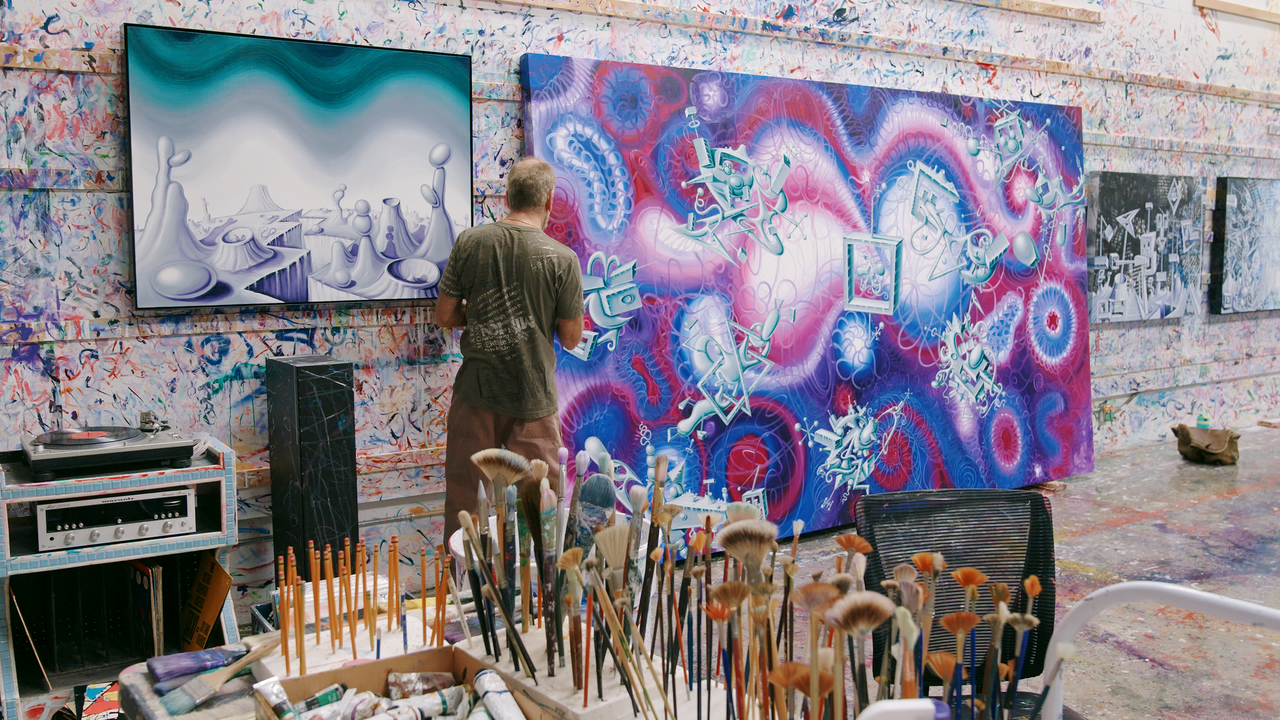Folie a Trois
Rock Follies: authenticity versus cynicism on the eve of punk
Rock Follies: authenticity versus cynicism on the eve of punk

At the time of its first transmission on Britain's Thames Television in February 1976 Rock Follies seemed to answer the prayers of the fashion-conscious for a prime-time drama that was hip to the happening end of Rock and Pop. Written by, and earning a BAFTA for, Howard Schuman, the series told the story of a girl group called The Little Ladies, struggling to find their way to stardom - 'sugar mountain' - across the no man's land of the British music scene in the months just before the first snarlings of Punk. With music by Andy Mackay, the virtuoso sax and woodwind player with Roxy Music, the series had every claim to pop cultural relevance, and was a huge success for its creators - Mackay's soundtrack album took the Number 1 chart spot in the early summer of 1976.
The Little Ladies comprised 'Q', Dee and Anna, played by Rula Lenska, Julie Covington and Charlotte Cornwell respectively. Brought together by the collapse of a sentimental musical, Broadway Annie - shown in the first episode as a last gasp of Tin Pan Alley schmaltz, and marking rock's search for a new kind of showbiz - the three women singers, adrift and unemployed, are urged to take up Rock music by their dandified but ruthless piano player, Derek 'Hyper' Huggins.
With the recent DVD release of Rock Follies it would be all too easy to find a place for the series in today's ever-expanding museum of cultural kitsch. But this would be a great disservice not simply to the sheer narrative exuberance of the series - squat politics, gigging in Shanklin, squaring up to the sleazy porno film director - but also to the sophistication of the broader issues that the drama addressed. For Schuman's script was breathtaking in both the pointedness and the satire of its social commentary. Repudiated at the time by its principal targets in the world of Rock as either camp, caricature or both, Rock Follies described not simply the absurdities of fashionability but also the widening schism between the notions of authenticity championed by Hard Rock on the one hand and the gleeful massaging of artifice that would become central to Punk on the other. It is difficult to imagine today's mediation of Pop music wanting - or being allowed - to critique its own subject in such a manner: in this respect, television's current relation to Pop - through Pop Idol, celebrity trivia and sponsorship deals - has far more in common with the rigid conservatism and innocence of Pop television in the early 1960s, during British beat music's swooning and crooning phase, overseen by such televisionaries as Jack Good. Rock Follies, on the other hand, was born of a darker, wearier sensibility, and its script was shot through with a unifying sense of collapse.
For The Little Ladies the road to Rock is as fraught with peril and deceit as any Pilgrim's Progress; for their academic, politically committed boyfriends back at the Camden squat (free love, house reading lists, benefit gigs for 'the Islington Nine') the burgeoning economic and political crises in Britain (the series itself was disrupted by industrial action) have corroded their Utopianism and curdled their ideals to cynicism. The soured liberalism of the squat will be revealed as tsarist patriarchal control ('The only way to deal with intellectual women is brute force', quips Hyper Huggins at one point), just as Rock music's promise to liberate is seen as ultimately answerable to the banalities and corruption of hard economics.
Schuman handled these tensions by employing a sense of edgy, neurasthenic acceleration and some brilliant set speeches that seemed to mingle Chekhov, the Record Mirror and early Time Out editorials in a way that summed up an epoch. In the final episode, for example, as The Little Ladies are standing quite literally in the smouldering ruins of their career, Anna exclaims: 'Oh Dee! You seem to have this pathetic delusion that there is some distinction between capitalism and your ideal of rock music. But rock is a celebration of capitalism! The pulse is pure jungle, survival of the fittest, and thousands of bands do struggle to survive - struggling for the bread to pay for all that capitalist-produced technology: amplifiers, electronic equipment, the apparatus of the recording studio - Rock is capitalist music!'
As the drama spirals through an index of manipulation and collapse, you might be reminded of Evelyn Waugh's second novel, Vile Bodies (1930), in which the febrile world of flappers and Bright Young Things - to which the fashionistas of the mid-1970s were looking back with such nostalgia for elegance - was described as dangerously centrifugal, whirling its players into a vortex of hysteria. As such, Rock Follies anatomized not simply decadence, in a Roman sense of social and imperial decay, but also the nostalgia for decadence that was so central to Pop's fashionability at the time. 'I don't have a generation!' wails Q at one point, 'not a live one, anyway - that's the problem ...'.
The series even included a pre-emptive response to those who said that Pop and Rock were beneath the concerns of serious social drama. From the character of Nigel Norris, a freelance music journalist writing for Rolling Stone (played by James Warwick, with twinkly public school boyishness) we get the still controversial assertion: 'I think one should apply the same critical standards to rock music as to any other art form' - thus identifying the vogue for intellectualism within the music press that would see the New Musical Express through the zenith of its popularity during the late 1970s and early 1980s. As Neil Tennant has pointed out, this climate of critical intellectualism, throughout post-Punk, would coincide with a particularly interesting and eclectic phase in Rock and Pop.
In this Rock Follies was somewhat prophetic. The prehistory of major cultural flashpoints - the years just prior to 'Swinging London' for example, or the New York loft art scene just before Warhol's first Silver Factory - can often be richly eloquent of the better-known eras that follow them. For it is within these prehistories that the elements of cultural shift begin to assemble, largely unknown to one another but combining to create an almost chemical process of change. Rock Follies in this respect can be seen to identify and critique a whole raft of ideas, fashions, personalities and influence, the significance of which would linger on well into the 1980s.
As The Little Ladies approach their first real chance of stardom, having swapped a bluesy kind of rock authenticity for a chic nostalgia for the 1930s - their sound changing, en route, from Stone the Crows to Manhattan Transfer - they encounter in the maître d' of Idols night-spot - one of those chorus-type characters who seem to serve as seers in a decadent age; you might compare him to the Master of Ceremonies in Cabaret (1972) or the hotel manager in Death in Venice (1971). Asked to explain the Zeitgeist, he delivers a speech that anticipates the wit of Peter York's essay 'Them' (1976), while managing the comic timing of Noël Coward at his most clipped. In a few perfectly pitched lines he seems to sum up not only the ethos of Rock Follies as a drama but also the ennui of an era: 'Remember, we opened in 1974,' he pronounces, ' - now that's a long time ago. It was the heyday of the elegance renaissance - Bryan Ferry in his white dinner jacket: a great era. Now The Little Ladies are victims of an elegance backlash. We're into hard times; the taste-makers are into khaki. We're moving into a grit cycle, a revulsion against excess. A bicycle cycle, if you like. Always happy to be of service, Mesdames. Je m'excuse.'
























